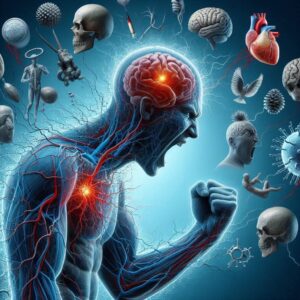Transform Your Anger: Effective Therapy Techniques for Positive Change
Anger is a fundamental human emotion that everyone experiences at different points in their lives. This intense feeling can arise from various situations such as intimidation, personal attacks, frustration, or experiences of harm, betrayal, or insult. It is essential to understand the complex nature of anger to foster personal growth and enhance emotional self-regulation. By identifying the roots and triggers of this powerful emotion, individuals can embark on a transformative journey toward healthier emotional responses and improved mental well-being, ultimately leading to more fulfilling lives.
Recognizing that experiencing anger is a natural part of being human is crucial; the real challenge lies in how we express and manage this emotion. The different expressions of anger—ranging from mild annoyance to intense rage—can significantly impact our relationships and overall well-being. By developing an awareness of these varied expressions, individuals can navigate their emotional landscapes more effectively, fostering healthier interactions and communication with others, which is vital for strong personal and professional relationships.
The physical symptoms of anger can manifest in numerous ways, including a racing heart, elevated blood pressure, and increased muscle tension. If left unaddressed, these feelings of anger can escalate into destructive behaviors that adversely affect relationships, career prospects, and overall life satisfaction. Identifying the signs of anger and comprehending the underlying causes are crucial steps toward managing this potent emotion effectively, ensuring that it does not dictate one’s life choices or experiences.
Anger triggers can emerge from various sources, including external events, internal thoughts and feelings, and physiological reactions. By exploring these triggers, individuals can gain valuable insights into their anger, paving the way for the development of effective coping strategies. This exploration can enhance personal growth and emotional intelligence, enabling individuals to proactively and constructively manage their feelings, especially in challenging or stressful situations.
Key Strategies for Mastering Effective Anger Management Techniques
- Recognize that anger is a natural emotional response, but it becomes problematic when not managed effectively.
- Unchecked anger can lead to serious repercussions for both mental and physical health.
- Participating in anger management therapy equips individuals with essential tools for constructive anger handling.
- Therapeutic methods introduce techniques such as deep breathing and improved communication skills to address emotional challenges.
- Therapy facilitates the identification of personal triggers and the deeper issues that contribute to anger.
 The Serious Health Risks of Uncontrolled Anger and Its Consequences
The Serious Health Risks of Uncontrolled Anger and Its Consequences
Exploring the Physical Health Risks Linked to Chronic Anger
Extensive research has established a significant correlation between prolonged anger and serious health complications. These complications can manifest as high blood pressure, cardiovascular diseases, and weakened immune systems, all of which may increase the likelihood of strokes and other severe medical emergencies. Moreover, chronic anger may lead to debilitating symptoms such as irritable bowel syndrome, insomnia, and tension headaches, which can disrupt daily functioning and overall health, significantly impairing quality of life.
The Ramifications of Uncontrolled Anger on Mental Health and Interpersonal Relationships
The repercussions of unmanaged anger extend far beyond physical health, creating substantial challenges for mental well-being. Persistent anger can serve as a precursor to anxiety disorders, depression, and substance abuse issues. Additionally, it can strain relationships, often resulting in conflicts and emotional distance from loved ones, thereby perpetuating a cycle of isolation and emotional distress that can be challenging to break free from without intervention.
Recognizing the Importance of Support: Developing Effective Anger Management Skills
Understanding the detrimental effects of uncontrolled anger on mental and physical health underscores the necessity of seeking assistance and acquiring effective anger management strategies. Individuals must confront the reality that unchecked anger can jeopardize their overall well-being. By grasping the long-term implications of persistent anger, they may feel compelled to actively pursue constructive strategies and support systems that facilitate healthy emotional expression and management, ultimately enhancing their quality of life.
Uncover the Life-Changing Benefits of Anger Management Therapy
Engaging in anger management therapy offers numerous advantages for individuals struggling with overwhelming anger. One of the primary benefits is the opportunity to explore the underlying causes of anger while gaining practical coping techniques tailored to their needs. During therapy sessions, individuals can analyze what triggers their anger, fostering a deeper understanding of their emotional responses and facilitating healthier coping mechanisms.
This self-awareness is crucial for developing effective anger management strategies. Therapy provides a safe and supportive environment where individuals can reflect on their emotions and learn healthier methods to express and cope with anger. Clients not only gain insights into their emotional states, but also develop essential communication skills that can enhance relationships and minimize conflict. By empowering individuals to regain control over their emotions, anger management therapy can lead to a more balanced and fulfilling life.
Furthermore, anger management therapy is vital for helping individuals break free from destructive behaviors often associated with uncontrolled anger. By interrupting harmful patterns, clients can reclaim control over their lives and cultivate healthier, more satisfying relationships. Implementing effective coping methods and stress management techniques allows individuals to mitigate the adverse effects of anger on their mental and physical health. Ultimately, the profound benefits of anger management therapy can result in lasting positive changes in an individual’s life.
 Diverse Techniques and Strategies Offered in Anger Management Therapy
Diverse Techniques and Strategies Offered in Anger Management Therapy
Anger management therapy equips clients with a variety of effective techniques and strategies for managing their anger constructively. One widely practiced method is deep breathing exercises, which help individuals regulate their physiological responses to anger while simultaneously alleviating stress and tension. Mindfulness meditation is another powerful technique introduced in therapy, encouraging individuals to concentrate on the present moment and enhance their awareness of their thoughts and emotions.
Cognitive restructuring is a pivotal aspect of anger management therapy. This approach involves identifying and challenging negative thought patterns, replacing them with more rational and balanced perspectives. By reframing their perceptions of triggering situations, individuals can learn to respond to anger in a more constructive manner. Additionally, therapy often includes problem-solving skills to assist clients in effectively addressing the root causes of their anger.
Moreover, assertiveness training is commonly incorporated into anger management therapy, empowering individuals to express their needs and establish healthy boundaries respectfully. Those who master these techniques in therapy can develop a versatile toolkit for managing their anger across various contexts, enhancing their adaptability and emotional resilience in the face of life’s challenges.
Gain Profound Insights: Understanding Anger Triggers and Roots Through Therapy
Therapeutic sessions provide individuals with the opportunity to investigate the specific triggers and underlying issues contributing to their anger. By reflecting on diverse situations, thoughts, and emotions, clients can gain valuable insights into what ignites their anger. Acknowledging these triggers enables individuals to recognize early warning signs before they escalate into uncontrollable rage, allowing for proactive emotional management.
Therapy serves as an essential resource for those seeking to identify their anger triggers and address the core issues fueling these feelings. This process may involve exploring past experiences, traumas, or learned behaviors that shape one’s emotional responses. Effectively confronting these underlying factors can lead to significant breakthroughs in healing emotional wounds, ultimately fostering a sense of peace and emotional equilibrium in one’s life.
In a therapeutic environment, individuals are provided with a safe space to explore their triggers and underlying concerns without fear of judgment or criticism. This journey of self-exploration can be empowering, equipping clients with the tools necessary for managing and channeling their anger in healthy and constructive ways, paving the path toward emotional healing.
The Crucial Role of Cognitive Behavioral Therapy in Transforming Anger Management
Confronting and Correcting Irrational Beliefs to Foster Rational Thinking
Cognitive Behavioral Therapy (CBT) is designed to confront irrational beliefs and replace them with logical, balanced thought processes. By identifying and addressing these cognitive distortions, individuals can cultivate a more constructive and realistic perspective on situations that trigger their anger, ultimately leading to healthier emotional responses and decision-making.
Gaining Practical Coping Strategies for Everyday Anger Management
In addition to recognizing cognitive distortions, CBT empowers individuals with practical coping strategies for managing anger effectively. Techniques such as relaxation exercises, assertiveness training, and problem-solving skills are essential for addressing the root causes of anger. These strategies provide individuals with actionable tools that can be applied in everyday situations to help regulate and manage their emotional responses, fostering resilience and emotional stability.
Enhancing Self-Awareness for Better Emotional Regulation
Furthermore, CBT enhances self-awareness by helping individuals understand the connections between their thoughts, emotions, and behaviors. By gaining clarity on these relationships, individuals are better equipped to manage their emotional reactions to anger-triggering situations. Mastering effective anger management is essential for fostering emotional regulation and overall well-being, and Cognitive Behavioral Therapy plays a significant role in this process, equipping individuals with the skills necessary to navigate their anger and improve their quality of life.
 Ensuring Long-Term Success: Ongoing Support and Resources After Therapy
Ensuring Long-Term Success: Ongoing Support and Resources After Therapy
For individuals who have completed anger management therapy, it is crucial to continue seeking support and utilizing available resources to maintain their personal growth. To further enhance their anger management skills, individuals might consider joining support groups or engaging in one-on-one counseling sessions. Support groups provide an excellent opportunity to connect with others facing similar challenges, fostering a sense of community and empathy. These groups create a space for sharing experiences and learning from one another, helping to diminish feelings of isolation while promoting a sense of belonging.
In addition to ongoing support, individuals can take advantage of various resources, including self-help books, online platforms, and mobile applications designed to assist in effective anger management. These tools provide additional strategies and methods for practicing healthy coping mechanisms outside of therapy sessions. Furthermore, maintaining progress after therapy may necessitate lifestyle adjustments that promote overall well-being, such as regular physical activity, balanced nutrition, adequate sleep, and stress-reduction practices.
Incorporating these lifestyle changes into daily routines can significantly lower the likelihood of experiencing overwhelming anger. Understanding and managing the powerful emotion of anger is essential for maintaining personal control. The consequences of uncontrolled anger can severely impact both mental and physical health, underscoring the necessity of seeking help through anger management therapy. This comprehensive understanding equips individuals with the knowledge they need to navigate their emotions effectively.
Therapy stands as a vital resource for individuals grappling with the complexities of uncontrolled anger. It empowers them to comprehend their emotional triggers, confront underlying issues, and acquire practical strategies while providing the necessary support for sustained progress. By equipping individuals with the knowledge and tools to manage their anger, therapy fosters healthier coping mechanisms and enhances overall emotional well-being.
Presented By:
References
- Teen Addiction Treatment Ames Iowa | Ember Recovery. https://emberrecovery.org/teen-addiction-treatment-in-iowa/
- Why Men Should Not Cover Up Their Emotional Distress | TheBeardMag. https://www.thebeardmag.com/lifestyle/health/why-men-should-not-cover-up-their-emotional-distress/
The Article: Interventions for Anger Management appeared first on Anger Management Leyland.
The Article Managing Anger: Proven Strategies for Success appeared first on https://mcrtherapies.com
The Article Proven Strategies for Success in Managing Anger Was Found On https://limitsofstrategy.com





Comments are closed